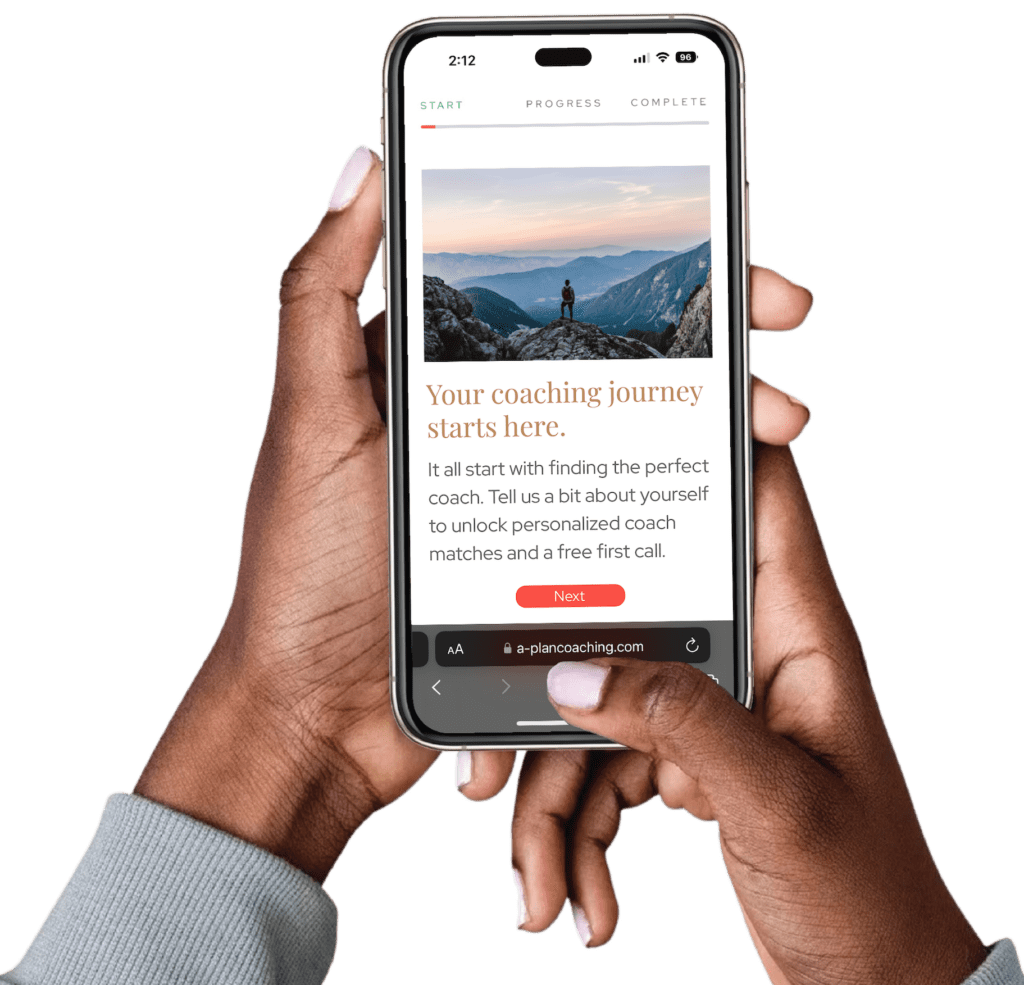Jump to section…

For aspiring and current leaders—team leaders, CEOs, entrepreneurs, and business owners—the question isn’t whether to improve their leadership skills but how. Two common and highly-regarded options are executive leadership coaching and traditional Master of Business Administration (MBA) programs. But which one delivers the practical, transformational results modern leaders need most?
This blog unpacks the strengths, limitations, and outcomes of both approaches. Whether you want to become a more self-aware leader, make better decisions, or improve team performance, this guide will help you determine the right path for your goals.
What Is Executive Leadership Coaching?
Executive coaching is a personalized development process for business leaders and senior professionals. It focuses on cultivating new skills through one-on-one coaching sessions with a dedicated coach. (Coaches are typically certified by organizations such as the International Coaching Federation (ICF).) Unlike traditional classrooms, executive coaching services adapt to the unique challenges and objectives of a leader’s professional life.
Key Features of Executive Leadership Coaching
Common practices in the executive leadership coaching experience include:
- A customized coaching approach tailored to individual aspirations and goals
- Feedback loops with actionable insights to address specific blind spots
- Practical applications that integrate real-time business scenarios into the coaching process
- Focus on emotional intelligence (EQ) to enhance interpersonal communication and achieve leadership harmony
Benefits of Coaching
Enhanced Self-Awareness: Leadership coaching helps leaders better understand their strengths and development areas through tools like 360-degree feedback. Self-awareness allows leaders to respond more thoughtfully to challenges and opportunities.
Strengthened Emotional Intelligence (EQ): Emotional intelligence is critical for effectively managing teams and stakeholders. Coaching hones competencies such as empathy, active listening, and conflict resolution, creating more effective leadership engagement.
Improved Decision-Making: Coaches act as a sounding board, helping leaders assess risks, weigh options, and make confident decisions.
Behavioral Change for Sustainability: A primary goal of coaching programs is enabling long-term change. Through accountability and ongoing coaching engagement, leaders can develop habits that positively affect their teams and the organization. Supports Leaders in Real-Time: Executive coaching dives deep into real-world challenges, such as shifting into new roles or managing high-performing teams. By working on immediate priorities, coaching delivers measurable impact quickly.
Who Should Choose Executive Coaching?
If you’re a C-suite executive, entrepreneur, or team leader seeking personalized growth, real-time solutions, and a methodology designed for individual transformation, coaching might be a better fit.

Interested in Coaching Services?
What Are Traditional MBA Programs?
MBA programs are globally recognized degrees designed to provide comprehensive business, finance, management, and marketing training. They typically span two years full-time (or part-time for working professionals) and often include internship opportunities or final projects to bridge the gap between theory and practice.
Benefits of an MBA
Comprehensive Knowledge: MBA programs teach the foundational aspects of business—strategy, leadership development, finance, and marketing—offering leaders a well-rounded skill set.
Career Boost: MBAs are prestigious credentials that can put professionals on leadership tracks while increasing their earning potential.
Network: MBA programs can connect students to alumni networks, mentors, and peers, creating opportunities for professional collaboration and career advancement. Strategic Thinking and Frameworks: Courses often focus on strategic thinking, enabling executives to tackle complex business challenges from a broad, analytical perspective.
Limitations of MBAs
- Limited focus on soft skills like emotional intelligence and adaptability, which are increasingly critical for modern leadership success
- Teaching is typically delivered in standardized formats, which may not address the specific needs of individual leaders
- Theories and case studies sometimes lack direct application to real-world problems, creating a gap between academic learning and day-to-day demands
Who Should Pursue an MBA?
Professionals who seek broad business acumen, long-term career networks, and credentials that open doors in corporate environments often gravitate toward MBAs.
Coaching vs. MBA Programs – A Comparison
What sets executive coaching apart from traditional MBAs? Here’s how they measure up in key areas of modern leadership development.
1. Customization
| Coaching provides a tailored experience focusing on a leader’s challenges, goals, and blind spots. | MBAs, while rigorous, follow standardized curriculums that may not address unique leadership needs. |
2. Practical Application
| Executive coaching integrates learning directly into real-time scenarios. For example, a facilitator may guide you through complex stakeholder negotiations or succession planning. | MBA programs emphasize academic theories supported by case studies over live, immediate business situations. |
3. Long-Term Impact
| Professional coaching fosters ongoing professional development, growing with you as new challenges arise. | An MBA degree offers foundational knowledge but may not adapt to the rapidly changing requirements of leadership. |
4. Cost and Time
| Coaching requires less time commitment and is more flexible. Coaching engagements can be as short as six months or ongoing, depending on your needs. They can also be in-person or virtual. | MBA programs often involve higher financial investments and require between 1-2 years of intensive study. |
5. Core Skills Developed
| Coaching excels in developing soft skills such as emotional intelligence, effective communication, and self-awareness. | MBA programs focus more heavily on technical skills such as financial modeling, strategic planning, and analytics. |
Main Takeaway: Many senior leaders and entrepreneurs find that executive leadership coaching equips them with relevant, actionable skills for real-world decision-making, which an MBA may not offer.
How to Build a Coaching Culture
Leadership doesn’t stop at individual development plans. Teams thrive when organizations embed coaching into their culture. Here’s how to get started with team coaching for scalable leadership development.
Pair Team and Individual Coaching: Combine team coaching with one-on-one coaching sessions to simultaneously address group dynamics and personal growth.
Focus on Diversity, Equity, and Inclusion (DEI): Effective team coaching prioritizes inclusiveness, encouraging diverse team members to thrive together.
Use Technology: Tools like a)plan’s proprietary coaching app make integrating coaching across distributed teams easier through efficient goal tracking and progress updates.
Create Scalability with Hybrid Coaching Models: Hybrid models allow team members and senior leaders to benefit from high-performing coaching programs tailored to organizational workflows.
Conclusion
While both executive leadership coaching and traditional MBA programs provide valuable tools for professional growth, coaching is the preferred choice for leaders who want to address the complexities of today’s workplace.
Why? It’s simple—effective leadership in the modern world relies not only on strategic thinking and business acumen but also on emotional intelligence, adaptability, and real-world problem-solving. These competencies cannot be adequately nurtured in a classroom but flourish in the personalized coaching framework.
If you’re interested in professional growth, retention of leadership skills, measurable behavior change, and long-term leadership transformation, consider coaching yourself or your team. Unlock your full potential with a world-class executive coaching program like those offered by a)plan. Contact us today to explore coaching engagements tailored to your goals!

Interested in Coaching Services?
